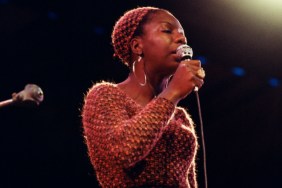The release a short while ago of Liz Garbus’ documentary What Happened, Miss Simone? occasioned the writing of a slew of think-pieces on the singer’s life, art and politics, all highlighting her tortured genius beneath it all.
One of the very best such pieces was Brian Phillips’ “Run to the Devil: The Ghosts and the Grace of Nina Simone” on Grantland. An empathetic and sympathetic piece, Phillips gave an in-depth overview of Simone’s biographical narrative that he wove into smart analysis of her career, how her internal chaos waltzed with the chaos of the world around her, catching the woman in the crossfire.
Just one of the many perfect passages in Phillips’ piece:
If you’re a writer, you think about describing Nina Simone’s voice and you just shake your head. It’s deep, deeper than some men’s voices, almost a baritone. But it doesn’t sound like a man’s voice. It can be booming and harsh, it can be airy and slight. It can be as hollow and clear as a flute, or it can twist into nasality, into a kind of deliberate half-strangulation, as though it is fighting itself. I have thought about this more than anyone probably should and the best adjective I can find is comfortless. Not merely inconsolable; not believing in consolation. As Simone’s career was taking off, Sam Cooke was on the radio crooning, “Soothe me, baby, soothe me.” But Simone knows that soothing is a lie. Or if it isn’t, it’s still of no use to her. The thorn is inside her, out of reach.

Nina Simone (Getty Images).
Like many who read the piece, writer Anne Branigin (aka Annie Frankly) was moved by it, chewing on it long after she finished it. And it inspired her to nudge the commentary in a slightly different but still related and relevant direction; she muses on what we, as both fans of an artist, and as a lover in our private lives, ask of those who feed and sustain us. Two lines from her piece: “…we diminish with entitlement the very people who set us free. And we dare to call that love.”
What will be interesting from here on out will be how we treat our geniuses, lovers and selves now that we’ve succumbed to the idiot’s notion that in order to have agency and visibility, we – and the artists we claim to love – must see ourselves and everyone around us as a brand. Both brilliance and excruciating existential pain are reduced to marketing (and marketable) aspects of our wholly commodified selves, and we accept these corporate dictated terms of “agency” and “visibility” as though they’re truths divined from nature itself.
Read Phillips’ full piece here. Read Branigin’s full piece here.
Ernest Hardy is a Sundance Fellow whose music and film criticism have appeared in the New York Times, the Village Voice, Vibe, Rolling Stone, LA Times, and LA Weekly. His collection of criticism, Blood Beats Vol. 1: Demos, Remixes and Extended Versions (2006) was a recipient of the 2007 PEN / Beyond Margins Award.








